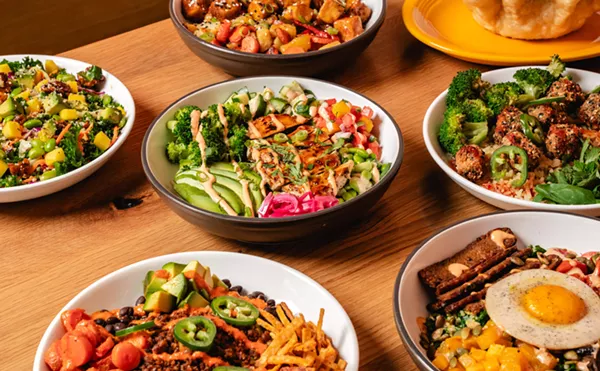I like to blame my line of work for my fat-ass predicament.
It's a convenient scapegoat, since as soon as I took the food-critic job, everything I shoveled in my mouth -- be it a pint of ice cream, a platter of green chile-cheese fries or a meal so rich I needed a couple of drams of Fernet to settle the stomach - could be chalked up to research. Suddenly, all-day feeding frenzies - along with 3 p.m. taco-truck snack stops, the occasional two-dinner night and massive dessert orders after massive feasts -- didn't seem out of line.
I lived in sheer, gluttonous bliss for the first few months of my new career, and in some ways, it was wonderful. But then the appeal of stuffing myself all day, every day began to wear off - I even craved leafy greens every now and then, which was an entirely new feeling for me - and my eating habits started to evolve. Before becoming a food critic, I could binge-eat with the best of them, practicing the old family motto, "If you get sick, just eat through it." But in the face of constant excess, I was developing a certain kind of moderation: I was learning to determine what was worth stuffing in my piehole until I squawked, and what was better left abandoned since a tastier version was surely just around the next corner.
So though I didn't know it at first, I wasn't a completely lost cause when I finally broke down and sought out Jamie Atlas at Bonza Bodies for help. And while he got me on the high-protein breakfast track, asked me to cut gluten and dairy while I wasn't eating for work, and got me in good-enough shape to start refeed workouts, he also cross-examined me for every detail he could pry out of me about my current eating habits -- hoping, no doubt, to find some glimmer of hope on which to latch, some habit of mine that he wouldn't have to tweak.
For my part, during workouts I was happy to blather on about dishes I'd recently consumed - it took my mind off the pain - but once, after I'd been comparing and contrasting a couple of different ramen bowls for him, analyzing noodle springiness and pork fat content, I paused just as the words "creamy, velvety collagen" were about to drip off the tip of my tongue. "I'm hopeless, aren't I?" I asked.
"Actually, there are some things you're doing very right," he said, which was enough to put a smug spring in my step for the rest of the day. But then he went on: "You even have an advantage in certain aspects."
Shut the damn door. I wasn't expecting that.
I asked him to please, please, expand upon his thoughts. He came back at me with his top five ways that eating like a food critic actually confers an advantage when it comes to losing weight.
1. I really, actually taste the food. I can't tell you how many meals I've mindlessly munched down while doing something else -- whether it was gossiping with friends at restaurants or reading at my kitchen counter - but that started to change when I became a critic. If I'm going to make astute observations and clever comments about dishes, I need to actually taste the food. Interestingly, a lot of dumb diet books really harp on this concept. Tasting your food means you appreciate it more. It means that you learn to differentiate between the good and the bad. And, most important to weight-loss, it means you recognize when you're full, thereby saving you from stuffing down that next bite. Actually tasting the food shifts your focus to satisfaction - and it's easier to get skinny when you want to eat food that satisfies you. Not to mention tasting your food makes eating a lot more fun. You really want to drop $100 on dinner and not remember anything about what you ate? I didn't think so.
2. I recognize that there's always more where that came from. The single biggest lesson that came from becoming a food critic is that, after more than two and a half decades of life, I finally grasped the elusive concept of portion control. As a kid, sharing a plate of food with my brother meant one of two things was going to happen: We were either going to competitively try to out-eat each other, cramming as much into our mouths as we could to prevent the other person from eating more, or we were going to split the dish exactly evenly, down to the last grain of rice, and polish off every single bite to, yes, prevent the other person from eating more. We may have been a middle-class suburban family, but we ate like we were at risk for starvation. I think that's why I've never been good at portion control, and why I'd just finish off a plate of food without thinking about it, even if I was full. But once I started actually tasting my food, I got full long before I'd finish the dish. And since there was no one waiting to stab me in the hand with his fork so he could eat the rest, I started to be okay with boxing up the leftovers or, you know, not eating every last crumb. Because the truth of the matter is, there's always more where that came from. By the way, Jamie suggests boxing up part of dinner before you START eating if you need help getting to this point.
3. I skip the foods that are never satisfying I don't have many food aversions -- I can really only think of one, and that's whole hard-boiled eggs - but I certainly have foods I like more than others, and a list of things that I just about always find boring. Chicken fits in that category. Why not just eat duck? Or pork? Cake is another one on this list. There are exceptions, but for the most part, cake is the "she's nice" of desserts. As in, "she doesn't have any other qualities that are worth talking about, but she's generally fine to be around. I might as well be around her." Just like I might as well eat the cake. Even though I'm totally not even going to think about it as I polish off the whole piece only to promptly forget everything about it as soon as the last bite slides down my gullet.
Long ago, I decided it wasn't really fair for me to judge a restaurant on dishes like that - unless the chicken or the cake was truly that restaurant's specialty, of course - because these very prejudices might influence my assessment. So I always skip the cake, which delights Jamie to no end because that means I have no trouble resisting it. "Figure out the foods that aren't ever satisfying and cross them off your list," he tells his clients. That way you won't binge-eat the mediocre cake and wallow in your guilt for a dessert that you can't even remember.
4. I've already convinced myself that my body deserves more than mediocrity My exploration of Denver's culinary landscape will never be complete, but I've done enough eating out in this town to know where my very favorite version of just about any dish is. Which makes it incredibly easy to say that the pork belly I'm fork-deep in is nowhere near as good as the pork belly two miles away. Or that the burger I'm chewing pales in comparison to at least ten other burgers in the city. And when that happens? I don't finish the dish, and I move on. Most of the time, the friends I'm sharing with happily polish off the remnants. Otherwise, I to-go box it and give it to someone who could use the meal more than me. Likewise, on the rare meals out when I'm NOT eating for work, I don't waste my time ordering mediocre dishes - I go right for the good stuff. Aim for satisfaction, and you learn to cut your losses - you eat less of the stuff you really like, and you feel happier, too. 5. A healthy lifestyle is a marathon (like, a lifetime one), not a sprint. When I jumped on the weight-loss train, I hoped I'd become svelte and sexy in a matter of weeks, like I have on other diets. Except I forgot that when I was on those diets, I wasn't a food critic, and I was able to eat nothing but lemon water and chicken if I really wanted (which, I can honestly say, I never, ever really wanted). I also forgot that about three weeks into most of those diets, I came crashing back to earth - usually with the help of my two favorite fat men, Ben and Jerry -- completely undoing any effects of my painstaking efforts.
I came back to reality (or maybe just to reality, since I'm not sure I was ever there to begin with) with Jamie: Even if I just ate my four required meals out a week and zealously stuck to Jamie's plan for every other second of my life, I simply wasn't going to shed fat as fast as the bride next to me who was forgoing all forms of fun for her big day. This bummed me out until I actually started to see results - without ever feeling like I was depriving myself. Because I had to indulge frequently, eating right the rest of the time didn't seem like a sacrifice. Which meant that the plan was easy to sustain, so the results, slowly but surely, kept rolling in. Did I lose weight as fast as Jamie's clients who stuck to his plan? Nope. But I got to a point where I was happy with my body - and there's no reason for me to ever go back (I'm still losing weight, by the way -- this blog does wonders to keep me on track). I'm pretty sure that's what all those dumb diet books are pushing - a lifestyle change that makes you skinny forever. Eating chicken and vegetables for every meal every day forever sounds like a death march. But eating out four times a week for the rest of my life? That I can handle.
So there you have it. Eat more like a food critic, un-fat your ass. And next week? I'll tackle how to survive the holiday feast without derailing yourself.
Following the plan? The step-by-step:
- Step one: turning the corner with a high protein breakfast
- Step three: getting a handle on the booze
- Step four: the short workout key
Watch for the next installment of Bar Belle next Monday.











